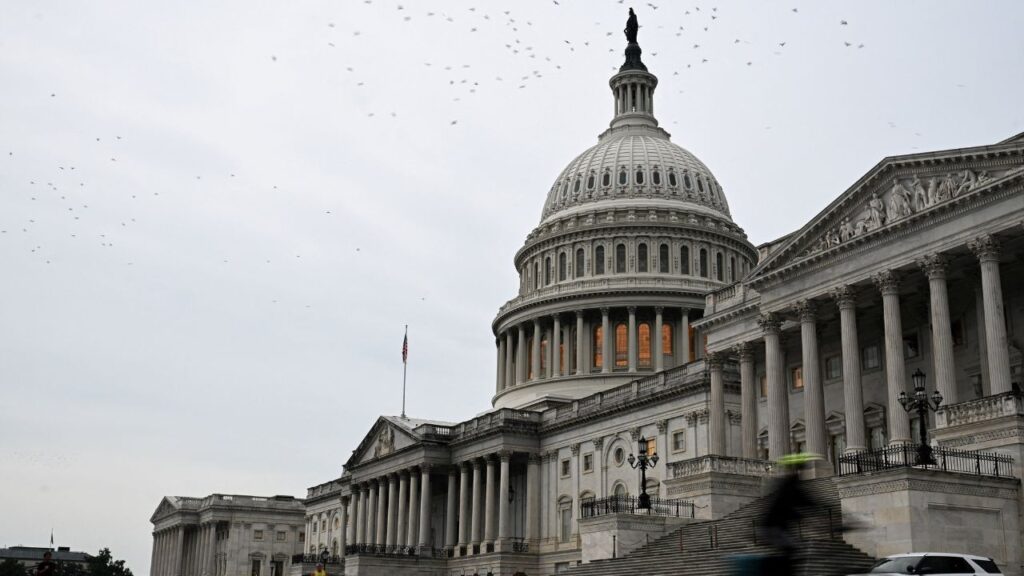California's latest invasive species, the golden mussel, threatens Delta ecosystems and water infrastructure. (AP/Leo Correa)

- Golden mussels found in California's Delta, posing risks to native species and water supply systems.
- State officials implement vessel inspections and enhanced measures to protect water infrastructure from mussel invasion.
- Experts debate the potential impact, with some fearing widespread damage while others remain skeptical of long-term effects.
Share
|
Getting your Trinity Audio player ready...
|
From the glittery bling of its name, the golden mussel sounds like it could be California’s state bivalve.

Alastair Bland
CalMatters
Unfortunately, the creature’s only connection to the Golden State is the fact that it is California’s most recently identified invasive species — and it’s a bad one, with the capacity to clog major water supply pipes.
On Oct. 17, the tiny freshwater mollusks, which have already laid siege to waterways of southern South America, were found at Rough and Ready Island, near Stockton. Since then, state officials said, it has been in at least one other location, O’Neill Forebay, in Merced County.
Its appearance in the Sacramento-San Joaquin Delta is the mussel’s first confirmed detection in North America, according to a news release from the California Department of Fish and Wildlife.
It’s also very possibly just the beginning of a long battle ahead to slow its spread. The top concerns at the moment include potential impacts to the environment and to the Delta pumping stations that send water to 30 million people and millions of acres of farmland.
Early Eradication Is Crucial
Unless it is contained and eliminated immediately, said UC Davis biologist Peter Moyle, there might be no getting rid of it.
“If we’re lucky, and we stage a real eradication effort in the area where it’s presently found, it might not be too costly and would be worth it,” he said.
But if such efforts fail, it could become a major problem for native species that the mussels outcompete for food.
The Department of Fish and Wildlife is already considering these worst-case outcomes.
“The species poses a significant immediate threat to the ecological health of the Delta and all waters of the state, water conveyance systems, infrastructure and water quality,” staff officials wrote.
The Department of Water Resources is already conducting vessel inspections in the hopes of preventing spread of the mussels. In the San Luis State Recreation Area, officials have been inspecting watercraft exiting O’Neill Forebay, San Luis Reservoir, and Los Banos Creek Reservoir, said Tanya Veldhuizen, the department’s special projects section manager. The inspections are to “ensure all water is drained from livewells and bilges to prevent spread of invasive species to other water bodies.”
The department, she said, is also taking heightened measures to protect the State Water Project — the system of pumps, pipes, and canals that exports water south from the Delta. This enhanced vigilance to mitigate “mussel biofouling,” she said, requires more frequent inspections, as well as cleaning and flushing. The mussels, she said, are likely to build up in screens, strainers, and trashracks.
Golden Mussel Can Spread up to 150 Miles in a Year
A native of China and Southeast Asia, the golden mussel — taxonomically Limnoperna fortunei — fixes itself to underwater surfaces, forming thick “reefs” built of millions of the animals. They feed by filtering nutrients and plankton from the water and, by this passive action, can have devastating impacts. Essentially, they filter the nutrition out of the native food web. In Argentina and southern Brazil, where golden mussels appeared in the 1990s, they have pushed out other species and smothered river beaches and native vegetation. Scientists have watched them spread north as rapidly as 150 miles per year, and they fear the invaders will find their way into the world’s largest river system and the hottest hotspot of biodiversity on Earth, the Amazon basin.
They’ve also wreaked mayhem with underwater infrastructure, from hydroelectric plants to water supply systems. The mussels, for example, reportedly clogged the intake pipes of an urban water supply system in Brazil’s Lake Guaíba.
“If we’re lucky, and we stage a real eradication effort in the area where it’s presently found, it might not be too costly and would be worth it.”
peter moyle, biologist, uc davis
No one can be certain how the mussels got to California, but sources suspect they arrived the same way they are believed to have traveled to South America — in the bowels of commercial ships, where ballast water used to stabilize vessels at sea is often drained in the port of arrival.
This practice has helped distribute aquatic species around the globe. While California shipping regulations prohibit ballast discharge with rules meant to keep it far offshore, unreported dumping and leakage may take place in state waters. Researchers at Cal State University, Long Beach, in an analysis of Southern California harbor pollution, reported that discharge “from the ballast tanks of ships, though illegal, does occur.”
Andrew Cohen, the director of the Center for Research on Aquatic Bioinvasions in Richmond, said he is not surprised by the mussel’s appearance in the Delta and has been expecting this for more than a decade. He said ballast water is routinely discharged in San Francisco Bay and the Delta.
Not everyone is particularly surprised, either. Moyle, for one, said he’s been expecting the golden mussel to arrive in the state for years. The California Delta, he noted, has been described as one of the most invaded estuaries in the world. It has been colonized by at least 185 foreign species, from Himalayan blackberries and fig trees to black bass, striped bass, and water hyacinth. According to one estimate, invasive species account for an astounding 95% or more of the estuary’s total biomass. The nutria — a large water-loving rodent from South America — has spread through the estuary in recent years amid concerns that it could, among other things, damage levees with its burrows.
There are even some Asian bivalves already living in the Bay and Delta. The Eurasian overbite clam, for one, spread through the waterway in the 1980s. Biologists say the species has likely played a role in the downfall of native fishes by absorbing the tiny food particles that they depend on. The failed recovery of the Delta smelt, for example, has been linked to the spread of these clams.
Now, scientists fear the golden mussel could add to these pressures.

Cohen said that if the golden mussel is, in fact, spreading through the Delta, “our chances of eliminating it are essentially nil.”
But how thoroughly it will spread is unknown.
Moyle said the Delta is so heavily impacted already, and its food resources already claimed, by other species — notably the filter-feeding clams — that there may be no room for the golden mussel to move in.
“The invasive clams take up a lot of niche space,” he said.
On the other hand, Moyle said, “it could be a super-invader” — an invasive species so adaptable and persistent that it replaces other invaders that came before it. The Delta’s average range of water temperatures and salinity, he said, are just right for the golden mussel.
But in such an ecologically ransacked place as the Delta, not everyone is concerned about another bump in the road. Brett Baker, a water attorney with the Central Delta Water Agency and a sixth-generation resident on Sutter Island — and a former biology student of Moyle — isn’t fazed by the golden mussel’s appearance.
“I’ve heard alarms all my life about quagga mussels, zebra mussels, mitten crabs, and nutria,” he said. “I just don’t think there’s enough slack in the system, or enough niche space, particularly for a species that isn’t evolved to live here … I’m pretty sure we won’t be talking about the golden mussel in 20 years, but I could be wrong.”
About the Author
Alastair Bland lives in Sonoma County, California. He writes about water, climate, marine research, agriculture and the environment, and his work has appeared at NPR, Time, East Bay Express, Audubon, Hakai, Slate, Smithsonian and other news outlets.
About CalMatters
CalMatters is a nonprofit, nonpartisan newsroom committed to explaining California policy and politics.
RELATED TOPICS:
Categories



















